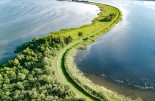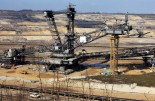Nature as a promising investment category (Roundtable Natural Capital - part 1)
Nature as a promising investment category (Roundtable Natural Capital - part 1)

This report was originally written in Dutch. This is an English translation.
Natural capital encompasses the natural resources and ecosystem services provided by the Earth that are essential to our lives and well-being, such as forests, water, soil, air and raw materials. This asset class is still relatively new in the institutional world. In part 1 of the Round Table on Natural Capital, six experts led by Sanne van Gorp of PGGM discussed what investing in nature entails.
By Hans Amesz
This is part 1 of the report. Part 2 can be read here, part 3 will be published on Monday 21 July.
|
Moderator Sanne van Gorp, PGGM
Participants Céline Claudon, IWC (meerderheidsbezit van BNP Paribas Asset Management) Jérôme Dulong, AXA IM Alts Sébastien Duquet, Mirova (onderdeel van Natixis Investment Managers) Arnold Gast, Morningstar Sustainalytics Ralf Kooken, a.s.r. real assets investment partners Mark de Nooij, MN |
What are you doing in terms of investing in natural capital and how does this relate to your overall investment strategy?
Sébastien Duquet: 'We manage approximately €30 billion and have raised around €1 billion over the past ten years for biodiversity and nature solutions.'
Mark de Nooij: 'As a pension fund, we invest to ensure a good financial pension for our participants, but also for a better world. Natural capital is woven into our entire portfolio through impact investing, engagement and ESG integration.'
Arnold Gast: 'We offer a wide range of ESG data and research. Last year, we launched a data product focused on biodiversity and natural capital, with 150 data points for assessing listed companies.'
Ralf Kooken: 'Although we have been investing in natural capital for more than 125 years as an insurer, the asset class is still relatively new in the institutional world. It is growing, partly due to sustainability considerations and its low correlation with traditional assets.'
Jérôme Dulong: 'At our company, climate considerations are integrated into all our investment decisions through a three-pronged approach: CO2 reduction in real estate, avoidance through infrastructure and sequestration through natural capital. For us, natural capital is the most direct means of making a positive impact.'
Céline Claudon: 'We focus exclusively on natural capital and offer investments in sustainable forestry, agriculture and ecosystem restoration. We have $6 billion under advice or management and offer customised solutions through funds, separately managed mandates, and fund of funds or advisory services.'
What is natural capital and why is nature so important in tackling the climate and biodiversity crisis?
Dulong: 'Natural capital is everything related to the products and services that nature provides. Without nature, there is no economy. Private capital is crucial because government budgets alone are not sufficient to finance the investments needed to tackle the climate crisis.'
De Nooij: 'Doing nothing will only make the problems worse. You have to incorporate sustainability considerations into your entire portfolio, not just into impact investments.'
What type of investors invest or want to invest in natural capital and what are their preferences?
Kooken: 'Our fiduciary clients cite three main reasons why natural capital is interesting: for sustainability, for stability and as an inflation hedge. It usually starts with a desire to contribute to climate and biodiversity, with the initial focus on forestry. Interest in agriculture usually grows as we delve deeper into the subject matter. For example, with permanent crops such as blueberries, almonds and pistachios. In this case, the land is not leased, but a manager is directly involved in the operation. This offers many opportunities to actively contribute to sustainability, which our clients find interesting.'
Duquet: 'We have over two hundred investors in various funds, with diverse motives and structures. In recent years, we have seen more interest from the business community (particularly among companies), especially around securing their value chain and carbon credits. These companies want to reduce their emissions by gaining a better understanding of the carbon footprint of their supply chain, particularly that of small-scale farmers.'
Claudon: 'Traditionally, pension funds and insurers have been the main investors in forestry and agricultural land. Recently, we have seen growing interest in natural capital from companies and family offices, often from a CO2 reduction or biodiversity perspective.'
Can you give a recent example of a biodiversity-focused project?
De Nooij: 'For one of our clients, we are investing in forestry in the southern United States. One of the projects is a conservation easement, in which we are working with local authorities to reforest native species and restore habitats. Although this results in a slightly lower direct return, this is fully offset by government support, which maintains the total return and increases the ecological value.'
Dulong: 'In Guatemala, we work with an NGO called Fundaeco. There, we protect endangered forests on the Atlantic coast in collaboration with indigenous communities. You see jaguars, manatees and migratory birds returning to their natural habitat. The impact on biodiversity is clearly visible.'
Duquet: 'We recently made three investments through our Carbon Credit Strategy, including one in Costa Rica. We were selected by eleven institutional investors to manage a biodiversity equity fund.'
|
Sanne van Gorp Sanne van Gorp works as an Investment Strategist in PGGM's Strategy Department. In her role, she advises PFZW on the fund's sustainable investment policy, drawing on her academic background in both finance and sustainability. She is working on the development of PFZW and PGGM's new impact strategy, which actively focuses on real-world impact. |
|
Céline Claudon Céline Claudon is Chief Commercial Officer at International Woodland Company (IWC), a specialist in natural capital. She has 20 years of experience in investing in natural capital, including evaluating portfolio managers for IWC's institutional clients. BNP Paribas Asset Management has a majority stake in IWC. |
|
Jérôme Dulong Jérôme Dulong is Head of Natural Capital Investments at AXA IM Alts and focuses on nature-based solutions and forestry. He is primarily responsible for the deployment of the AXA IM Natural Capital Fund, which was established with a $500 million investment by the AXA Group and invests globally in nature conservation and restoration projects. |
|
Sébastien Duquet Sébastien Duquet is Head of DFI & Sovereign Business at Mirova (part of Natixis Investment Managers). He develops private funds for development finance institutions and foundations, with a focus on energy transition and natural capital. Previously, he was CIO at Symbiotics. Duquet has also led Oxus and PlaNIS. He is co-founder of FinanCités and Planet Guarantee and has worked at Arthur Andersen and EY. |
|
Arnold Gast Arnold Gast joined Morningstar Sustainalytics in 2022, where he currently leads the ESG Sector Research team. This team consists of approximately 90 research analysts who provide company-level ESG ratings that assess risks, controversies and climate change impact. Previously, Gast worked at Shell Pensioenbureau Nederland, ILX, ACTIAM and Delta Lloyd Asset Management, among others. |
|
Ralf Kooken Ralf Kooken focuses on global infrastructure and natural capital investments in which a.s.r. real assets investment partners invest on behalf of its clients. He develops investment strategies and is responsible for the implementation and management of these investments. Kooken has extensive experience, both in the Netherlands and internationally, and is skilled in developing sustainable investment strategies, formulating net-zero policies and conducting climate scenario analyses. |
|
Mark de Nooij Mark de Nooij has an educational background ranging from Electrical Engineering at Delft University of Technology to General Management at Nijenrode Business University. He began his professional journey as an Engineer at Wartsila, followed by a move to MN, where he started working as an Investment Strategist. At NZ-Funds in New Zealand, he flourished as a Portfolio Manager. He has been back at MN since 2012. |

















